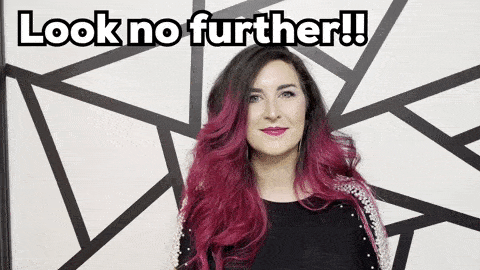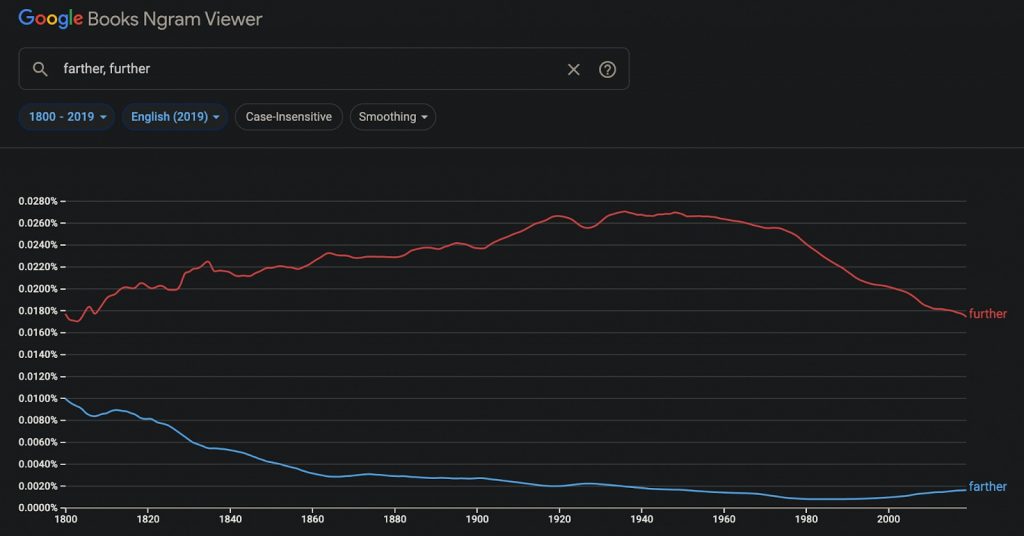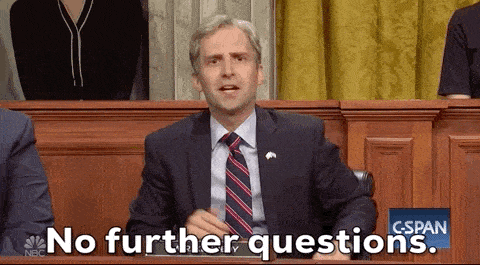Farther vs further, these words have been confused by many and used interchangeably over the years. Like, affect vs effect the near identical pair has caused much confusion about which one should be preferred over the other. It turns out that the answer to that question is a pretty elusive one. If you have ever argued internally with yourself over which of them to use and ultimately given up and gone with a different word to avoid embarrassment, this article is for you.
These words have a long and tangled history but etymologically come from the same word. In this article, we are going to break down the difference between these two words. We’ll take a look at the different ways and word forms that each of them can be used, and bring up some examples of how they’ve been used throughout history.
If you want to speak English like a native, umming and awing over confusing word pairs can affect how you come across in a conversation. If you want to have confidence whenever you need to slip in a word that you’re not that comfortable using, you have to familiarize yourself with the usage and be able to recognize how other people use it. Check out our articles on effect vs affect, grammar rules for the, how to address a letter, and more at AmazingTalker.
Table of Contents
Farther vs Further: Rules of Thumb

These two words, farther vs further, have rules commonly associated with them, which is what makes them tricky because if there were no rules, people would just use them and no one would try to correct them. If you’re worried about making a mistake, the simplest rules to follow for each of them are:
- Farther: Use farther only when referring to a physical or symbolic distance.
- The restaurant is farther away than it says on the GPS. (farther = a greater physical distance)
- I don’t want to take it any farther than this. (farther = a greater figurative distance)
- Further: Use further only when implying “additional” or “more”
- The problem requires further assistance. (further = more assistance)
- We will keep you updated if any further charges are incurred (further = more/ additional charges)
Sticking to those two rules should keep you on the safe side of usage, and people will find it hard to disagree with you when you do.
“Farther” and “further” might bring to mind the word “far”. It’s easy to understand why; you can actually see and hear the word “far” in “farther”, but neither of these words is actually connected to “far”. Unlike the difference between affect and effect, which have different etymological origins in Latin despite how similar their current forms sound, farther and further are related to the English word “forth” as in “back and forth” and “forthcoming”. They are also connected to the Old English “furthor,” “furthra,” and “fyrthrian.”
If you already know about the different parts of speech from your advanced English classes, you might be wondering how they can be used in a sentence. Like both effect or affect, farther and further are used as different word classes.
Farther vs Further: As an Adjective
- Farther
- Mom told us never to go to the farther side of the city.
- I could see the smoke rising from the farther hills.
- Further
- Any further delays on the orders will surely annoy the customers.
- Further deposits will be subjected to interest.
Farther vs Further: As a Verb
Farther doesn’t have a verb form, especially when it comes to modern usage. This is one of the few instances where you can’t interchange farther and further without raising more than a few eyebrows. In other words, you can “further” something but you can’t “farther” it.
- Further
- I need more funding in order to further my research.
- My goal for this year is to further my weight loss progress.
Farther vs Further: As an Adverb
- Farther
- I live farther away from the office than you do.
- He ran farther than anyone else on the team.
- Further
- Further testing can ensure more consistent results
- He pushed further until he was out of strength.
Despite the rules we introduced to you in the beginning, you will find that the adverb form of further is also frequently used by native speakers to denote distance. Keep in mind that some people may disagree with your choice of words if you do. This “distance vs more” rule can be a little hazy in many situations, which is another reason why they interchanged so often. For example:
- We decided to drill further for well water. (the context can imply more drilling, drilling a greater distance, or both at the same time)
- Pursuing this any further will not help us achieve our goal. (pursuing implies movement, can imply pursuing to a greater symbolic distance, can also mean more or continuation of the pursuit, or both at the same time)
Farther vs Further: Examples from history
Historically this aforementioned word pair has had a tangled history for hundreds of years. Of the two, “further” came first while “farther “was later derived from it as a variation in Middle English. “Further” has always been used more often, as you can see from this Google Books Ngram graph from the year 1800 – 2019.

For much of their history, the words have been used interchangeably, breaking the rules of “distance vs more” discussed above.
For example:
He became aware that Mr. Jackson was clearing his throat preparatory to farther revelations. — Edith Wharton, The Age of Innocence, 1920 (farther = more revelations)
Gatsby believed in the green light, the orgastic future that year by year recedes before us. It eluded us then, but that’s no matter—tomorrow we will run faster, stretch out our arms farther… — F. Scott Fitzgerald, The Great Gatsby, 1925 (farther = symbolically stretching arms more/to a greater extent)
”Well,” he began, without any further greeting…. — Katherine Anne Porter, Ladies’ Home Journal, Aug. 1971 (further = more/any additional greeting)
The Russian artillery fire and bombs are reaching further into the southern sections of the city. — Alessandra Stanley, New York Times, 17 Jan. 1995 (further = a greater physical distance into sections of the city)
The town, such as it is, is one of those Northwest places that look like the outskirts of somewhere bigger, further down the road, but turn out to be all there is. — Jonathan Raban, New York Review of Books, 26 Mar. 2009 (further = a greater physical distance down the road)
Neptune, first discovered in 1846, is nearly four times wider than Earth and 30 times farther from the sun than our planet. — Joseph Pisani, WSJ, 22 Sep. 2022 (farther = greater distance)
While both plane makers are about equally behind on deliveries, Boeing is further behind on producing new 737 MAX jets than Airbus is with its comparable single-aisle aircraft, according to Mr. Morris at Cirium. — Andrew Tangel, WSJ, 3 Oct. 2022 (further = a greater metaphorical distance on production)
More Commonly Confused Words
Due to the similar sounds of several different confusing word pairs in English, you might be able to get away with forgetting which word is which because people can fail to distinguish between them or dwell on any inconsistencies in your speech when you talk fast or speak with an accent. But writing presents greater difficulties. Erroneous spelling jumps out visually to people when they read text.
If you’ve ever sent a message saying “Cheers too you!”, “That’s to much!”, or left a comment like “Happy Birthday too you!” “Me to!”, then you can understand how awkward even these little typos can be. Let’s talk about some other word pairs like the difference between to or too.
To vs Too
- To: This word can be used to express the direction or limits of something, whether it points to a certain object, person, location, time, or number. It is also sometimes used with the root or radical form of a verb, especially when appearing after verbs like (want, need, like, or love). For example:
- Happy birthday to you! (expresses the direction towards the direct object “you”)
- From Monday to Friday, I work from 9 a.m. to 5 p.m. (expresses temporal directions and limits, meaning from Monday “until” Friday, from 9 a.m. “until” 5 p.m.)
- I would love to go out for coffee with you sometime. (paired with the radical verb “go”)
- To be fair to him, I think he did a good job. (first use is paired with the radical verb “be”, the second use expresses direction towards the pronoun “him”)
- Too: This word is used to mean “in addition” or “also.” It can also be used to indicate that something has exceeded the desirable or permissible degree or amount. For example
- Happy birthday too, you! (unlike with the first example using “to”, in this one, too = “in addition” or “also”, implies the greeting is responding or adding to something else like a previous greeting)
- On weekdays, I work too much! (too = exceeding the desired amount of work)
Affect vs Effect
- Affect: This word means to act on or to produce an effect or change or to impress the mind or move the feelings of someone. For example:
- Using salt can affect the taste of the meat. (affect = change)
- The documentary’s story really affected me. (affect = moved the feelings)
- Effect: This word means something that is produced by an agency or cause. When used as a verb, it can also mean to produce an effect or to make a change or accomplish.
- The effects of the medicine are making me want to lie down. (effects = something that is produced by the medicine)
- The government has finally effected change to the terrible traffic jams in the city. (effect = accomplish change/make change happen)
Let’s take a step farther/further!

Soon you will be able to instinctively intuit the differences between farther and further in spite of the initial confusion they may have caused. With regular reading and writing practice and some help from our amazing English tutors at AmazingTalker, you can master them in no time!
Now that you know how flexibly many writers have used both farther and further in the past, you can relax a little bit when you find yourself in a conundrum over which words to choose. Aside from confusing word pairs, the English language also has a lot of words with multiple meanings, so be sure to check out our article on that. You can also learn all about confusing word pairs in other languages, such as the dreaded ser vs estar in Spanish.
Check out AmazingTalker to learn more about language and culture not just in English, but also in a range of other fascinating languages from our partnered tutors!
















